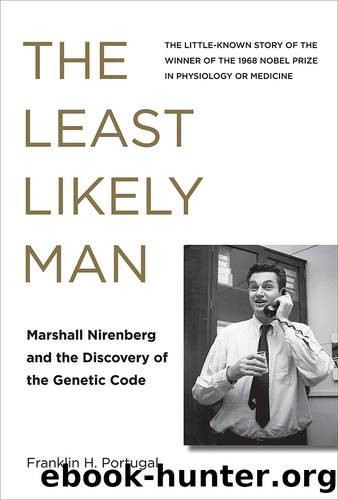The Least Likely Man by Franklin H. Portugal

Author:Franklin H. Portugal [Portugal, Franklin H.]
Language: eng
Format: epub
ISBN: 9780262028479
Publisher: MIT Press
Published: 2015-07-14T16:00:00+00:00
8
The Cold War
In August of 1961, Marshall along with Matthaei perched on the cusp of a biological revolution. Marshall was scheduled to give a talk at the International Congress of Biochemistry in Moscow. Just before leaving for Russia, he married Perola Zaltzman, a biochemist from Rio de Janeiro who also worked at NIH. The two had met when they both lived on the NIH campus in the same building and had adjoining apartments.1 The couple planned to meet for a leisurely, two-week honeymoon after the meeting.
The meeting in Moscow occurred at the height of the Cold War with Russia, which extended from 1947 to 1991. In August 1961, the West rebuffed the Soviet Unionâs demand to leave West Berlin. In response, East Berlin erected the infamous Berlin Wall to stem the flow of East Germans trying to escape Communism by crossing over to the West sector.
Fifteen months earlier, the United States had been embarrassed when a high altitude spy plane had been shot down while monitoring Soviet nuclear arms activity. As a result, a scheduled meeting between President Eisenhower and Soviet leader Nikita Khrushchev was canceled after President Eisenhower explained that the plane was an off-course weather plane. In fact, Khrushchev had withheld news that the pilot had survived along with enough debris to identify the planeâs spyware.
Four months before the Congress, a Soviet cosmonaut, Yuri Gagarin, had orbited the Earth in Vostok 1 and returned safely. The streets of Moscow remained littered with placards bearing his portrait. It would be another eight years before the United States caught up to the Soviet Union in the space race.2
Fortunately, the Biochemistry Congress itself proved more peaceful, as scientists attended from 58 different countries. A. I. Oparin, president of the Biochemical Society of the U.S.S.R., in the opening session, presciently commented, almost as if here were talking directly to Marshall, âYouth is our future. The fate of the science to which we have dedicated our lives is in their hands. ⦠I would like to hope that this Congress will remain in the hearts of these young people as one of the most important events in their scientific lives.â3
Marshall Makes His Mark
Marshall may not have realized at that moment that he was about to assume a mantle of scientific leadership. His scheduled presentation bore little resemblance to the benign abstract previously submitted in advance of the meeting. Some 6,000 people attended. The organizers had invited more than half of the 3,500 foreign scientists to present their findings. Marshall was just one of many. He had missed the symposium in Baltimore five years earlier. Now he was about to step onto a world stage at the Congress in Moscow.
Bernard Agranoff, who met Marshall in Moscow, remembered nervous jokes among the Western European and American attendees about being followed or rooms that might have been bugged. Despite the Cold War, no major political flaps occurred. Stolid, humorless representatives of Intourist, the official (and only) Soviet travel agency, handled travel or accommodation issues.
Download
This site does not store any files on its server. We only index and link to content provided by other sites. Please contact the content providers to delete copyright contents if any and email us, we'll remove relevant links or contents immediately.
Spare by Prince Harry The Duke of Sussex(5162)
Machine Learning at Scale with H2O by Gregory Keys | David Whiting(4278)
Never by Ken Follett(3911)
Harry Potter and the Goblet Of Fire by J.K. Rowling(3830)
I Have Something to Say by John Bowe(3486)
Unfinished: A Memoir by Priyanka Chopra Jonas(3361)
Fairy Tale by Stephen King(3347)
Greenlights by Matthew McConaughey(3138)
The Man Who Died Twice by Richard Osman(3051)
Will by Will Smith(2888)
Think Again by Adam Grant(2447)
Rationality by Steven Pinker(2335)
It Starts With Us (It Ends with Us #2) by Colleen Hoover(2312)
Can't Hurt Me: Master Your Mind and Defy the Odds - Clean Edition by David Goggins(2305)
The Dark Hours by Michael Connelly(2288)
The Storyteller by Dave Grohl(2210)
Friends, Lovers, and the Big Terrible Thing by Matthew Perry(2204)
The Dawn of Everything: A New History of Humanity by David Graeber & David Wengrow(2177)
The Becoming by Nora Roberts(2175)
